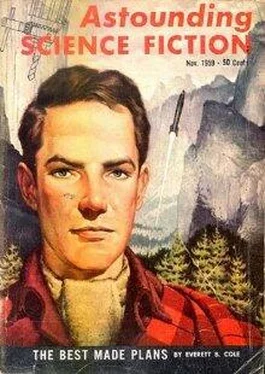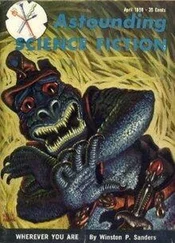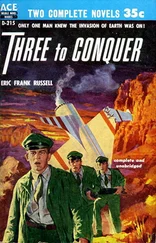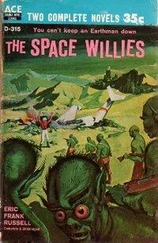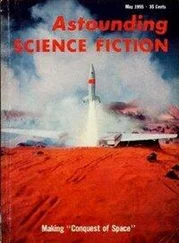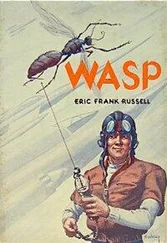Eric Russell - Panic Button
Здесь есть возможность читать онлайн «Eric Russell - Panic Button» весь текст электронной книги совершенно бесплатно (целиком полную версию без сокращений). В некоторых случаях можно слушать аудио, скачать через торрент в формате fb2 и присутствует краткое содержание. Год выпуска: 1959, Издательство: Street & Smith Publications, Inc., Жанр: Фантастика и фэнтези, на английском языке. Описание произведения, (предисловие) а так же отзывы посетителей доступны на портале библиотеки ЛибКат.
- Название:Panic Button
- Автор:
- Издательство:Street & Smith Publications, Inc.
- Жанр:
- Год:1959
- ISBN:нет данных
- Рейтинг книги:3 / 5. Голосов: 1
-
Избранное:Добавить в избранное
- Отзывы:
-
Ваша оценка:
- 60
- 1
- 2
- 3
- 4
- 5
Panic Button: краткое содержание, описание и аннотация
Предлагаем к чтению аннотацию, описание, краткое содержание или предисловие (зависит от того, что написал сам автор книги «Panic Button»). Если вы не нашли необходимую информацию о книге — напишите в комментариях, мы постараемся отыскать её.
Panic Button — читать онлайн бесплатно полную книгу (весь текст) целиком
Ниже представлен текст книги, разбитый по страницам. Система сохранения места последней прочитанной страницы, позволяет с удобством читать онлайн бесплатно книгу «Panic Button», без необходимости каждый раз заново искать на чём Вы остановились. Поставьте закладку, и сможете в любой момент перейти на страницу, на которой закончили чтение.
Интервал:
Закладка:
Panic Button
by Eric Frank Russell

Illustrated by van Dongen
“The law of chance,” said Lagasta ponderously, “lays it down that one cannot remain dead out of luck for everlasting.” He had the fat oiliness typical of many Antareans; his voice was equally fat and oily. “Sooner or later the time must come when one finds a jewel in one’s hair instead of a bug.”
“Speak for yourself,” invited Kaznitz, not caring for the analogy.
“That time has arrived,” Lagasta went on. “Let us rejoice.”
“I am rejoicing,” Kaznitz responded with no visible enthusiasm.
“You look it,” said Lagasta. He plucked a stalk of grass and chewed it without caring what alien bacteria might be lurking thereon. “We have found a new and empty world suitable for settlement. Such worlds are plenty hard to discover in spite of somebody’s estimate that there must be at least a hundred million of them. The vastness of space.” He ate a bit more grass, finished, “But we have found one. It becomes the property of our species by right of first discovery. That makes us heroes worthy of rich reward. Yet I fail to see delirious happiness on what purports to be your face.”
“I take nothing for granted,” said Kaznitz.
“You mean you sit right here on an enormous lump of real estate and don’t believe it?”
“We have yet to make sure that nobody has prior title.”
“You know quite well that we subjected this planet to most careful examination as we approached. Intelligent life cannot help betraying its presence with unmistakable signs for which we sought thoroughly. What did we see? Nothing! Not a city, not a village, not a road, not a bridge, not one cultivated field. Absolutely nothing!”
“It was a long-range survey of the illuminated side only,” Kaznitz pointed out. “We need to take a much closer look—and at both sides.” Havarre lumbered over and sat beside them. “I have ordered the crew to get out the scout boats after they have finished their meal.”
“Good!” said Lagasta. “That should soothe Kaznitz. He refuses to believe that the planet is devoid of intelligent life.”
“It is not a matter of belief or disbelief,” Kaznitz gave back. “It is a matter of making sure.”
“We are soon to do that,” Havarre told him. “But I am not worried. The place looks completely uninhabited.”
“You can’t weigh up a world with one incoming stare no matter how long and hard you make it,” Kaznitz asserted. “The absence of people spread widely and in large numbers doesn’t necessarily mean no concentration of them in small number.”
“You mean Terrans?” queried Havarre, twitching his horsy ears.
“Yes.”
“He’s been obsessed with Terrans ever since Plaksted found them encamped on B417,” remarked Lagasta.
“And why shouldn’t I be? Plaksted had gone a long, long way merely to suffer a disappointment. The Terrans had got there first. We’ve been told that they’re running around doing the same as we’re doing, grabbing planets as fast as they can find them. We’ve been warned that in no circumstances must we clash with them. We’ve strict orders to recognize the principle of first come first served.”
“That makes sense,” opined Havarre. “In spite of years of haphazard contact we and the Terrans don’t really know what makes the other tick. Each side has carefully refrained from telling the other anything more than is necessary. They don’t know what we’ve got—but we don’t know what they’ve got. That situation is inevitable. It takes intelligence to conquer space and an intelligent species does not weaken itself by revealing its true strength. Neither does it start a fight with someone of unmeasured and immeasurable size, power and resources. What d’you think we ought to do with Terrans—knock off their heads?”
“Certainly not!” said Kaznitz. “But I shall feel far happier when I know for certain that a task force of one thousand Terrans is not snoring its collective head off somewhere on the dark side of this planet. Until then I don’t assume that the world is ours.”
“Always the pessimist,” jibed Lagasta.
“He who hopes for nothing will never be disappointed,” Kaznitz retorted.
“What a way to go through life,” Lagasta said. “Reveling in gloom.”
“I fail to see anything gloomy about recognizing the fact that someone must get here first.”
“How right you are. And this time it’s us. I am looking forward to seeing the glum faces of the Terrans when they arrive tomorrow or next month or next year and find us already here. What do you say, Havarre?”
“I don’t think the subject worthy of argument,” answered Havarre, refusing to take sides. “The scout boats will settle the issue before long.” He got to his feet, ambled toward the ship. “I’ll chase the crew into action.”
Lagasta frowned after him. “The company I keep. One has no opinions. The other wallows in defeat.”
“And you wag your tail while the door is still shut,” Kaznitz riposted.
Ignoring that, Lagasta gnawed more grass. They sat in silence until the first scout boat came out, watched it take off with a loud boom and a rising whine. A bit later a second boat bulleted into the sky. Then more of them at regular intervals until all ten had gone.
“Waste of time, patience and fuel,” declared Lagasta. “There’s nobody here but us first-comers.”
Kaznitz refused to take the bait. He gazed at the ragged horizon towards which a red sun sank slowly. “The dark side will become the light side pretty soon. Those boats won’t get back much before dawn. Think I’ll go and enjoy my bunk. A good sleep is long overdue.”
“It’s a wonder you can enjoy anything with all the worries you’ve got,” observed Lagasta with sarcasm.
“I shall slumber with the peace of the fatalistic. I shall not sit up all night eating weeds while tormented with the desire to be proved right and the fear of being proved wrong.” So saying, he went to the ship conscious of the other scowling after him. Like all of the crew he was sufficiently weary to fall asleep quickly. Soon after dark he was awakened by die switching on of the radio beacon and the faint but hearable sound of the subsequent bip-bip-yidder-bip. Much later he was disturbed by Havarre going to bed and, later still, by Lagasta.
By dawn they were so deep in their dreams that none heard the return of the scout boats despite the outside uproar ten times repeated. They grunted and snuffled in unconscious unison while nine pilots emerged from their vessels looking exhausted and bored. The tenth came out kicking the grass and jerking his ears with temper.
One of the nine stared curiously at the tenth and asked, “What’s nibbling your offal, Yaksid?”
“Terrans,” spat Yaksid. “The snit-gobbers!”
Which was a very vulgar word indeed.
“Now,” said Lagasta, displaying his bile, “tell us exactly what you saw.”
“He saw Terrans,” put in Kaznitz. “Isn’t that enough?”
“I want no interference from you,”
Lagasta shouted. “Go squat in a thorny tree.” He switched attention back to Yaksid and repeated, “Tell us exactly what you saw.”
“I spotted a building in a valley, swept down and circled it several times. It was a very small house, square in shape, neatly built of rock slabs and cement. A Terran came out of the door, presumably attracted by the noise of my boat. He stood watching me zoom round and round and as I shot past the front he waved to me.”
“Whereupon you waved back,” suggested Lagasta in his most unpleasant manner.
Читать дальшеИнтервал:
Закладка:
Похожие книги на «Panic Button»
Представляем Вашему вниманию похожие книги на «Panic Button» списком для выбора. Мы отобрали схожую по названию и смыслу литературу в надежде предоставить читателям больше вариантов отыскать новые, интересные, ещё непрочитанные произведения.
Обсуждение, отзывы о книге «Panic Button» и просто собственные мнения читателей. Оставьте ваши комментарии, напишите, что Вы думаете о произведении, его смысле или главных героях. Укажите что конкретно понравилось, а что нет, и почему Вы так считаете.
